| Source (Hebrew) | Translation (English) |
|---|---|
אֲדוֹן עוֹלָם אֲשֶׁר מָלַךְ בְּטֶֽרֶם כׇּל־יְצִיר נִבְרָא׃ לְעֵת נַֽעֲשָׂה כְּחֶפְצוֹ כֹּל אֲזַי מֶֽלֶךְ שְׁמוֹ נִקְרָא׃ |
Reigned the universe’s Master, ere were earthly things begun; When his mandate all created Ruler was the name He won; |
וְאַֽחֲרֵי כִּכְלּוֹת הַכֹּל לְבַדּוֹ יִמְלֹךְ נוֹרָא׃ וְהוּא הָיָה וְהוּא הֹוֶה וְהוּא יִֽהְיֶה בְּתִפְאֲרָה׃ |
And alone He’ll rule tremendous when all things are past and gone. |
וְהוּא אֶחָד וְאֵין שֵׁנִי לְהַמְשִׁיל לוֹ לְהַחְבִּירָה׃ בְּלִי רֵאשִׁית בְּלִי תַּכְלִית וְלוֹ הָעֹז וְהַמִּשְׂרָה׃ |
He no equal has, nor consort, He, the singular and lone, Has no end and no beginning; His the sceptre, might, and throne, |
וְהוּא אֵלִי וְחַי גּֽוֹאֲלִי וְצוּר חֶבְלִי בְּיוֹם צָרָה׃ וְהוּא נִסִּי וּמָנוֹס לִי מְנָת כּוֹסִי בְּיוֹם אֶקְרָא׃ |
He’s my God and living Saviour, rock to whom in need I run; He’s my banner and my refuge, fount of weal when called upon; |
בְּיָדוֹ אַפְקִיד רוּחִי בְּעֵת אִישַׁן וְאָעִֽירָה׃ וְעִם רוּחִי גְּוִיָּתִי אֲדֹנָי לִי וְלֹא אִירָא׃ |
In His hand I place my spirit, at night-fall and rise of sun, And therewith my body also; God’s my God — I fear no one. |
Adon Olam is a piyyut that became popular in the 15th century and is often attributed to Solomon ibn Gabirol (1021–1058) and less often to Sherira Gaon (900-1001), or his son, Hai ben Sherira Gaon (939-1038). The variation of the piyyut appearing here is the 10 line version familiar to Ashkenazi congregations. (There are also twelve, fifteen, and sixteen line variants found in Sepharadi siddurim.) The rhyming translation here by George Borrow was shared in his tales in The Bible in Spain (1843), ch. 54, p. 222. (The text in the 1913 edition on page 546 is a bit easier to read.) There, Borrows transliterates the title as “Adun Oulem.”
Source(s)



“אֲדוֹן עוֹלָם (אשכנז) | Adōn Olam (rhyming translation by George Borrow, 1842)” is shared through the Open Siddur Project with a Creative Commons Attribution-ShareAlike 4.0 International copyleft license.
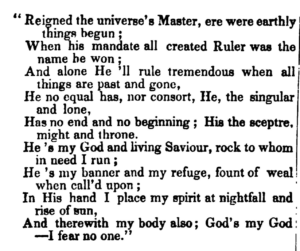
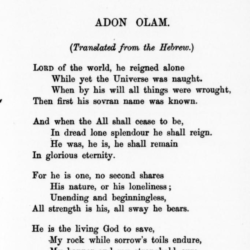
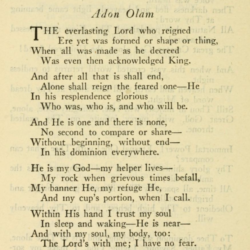
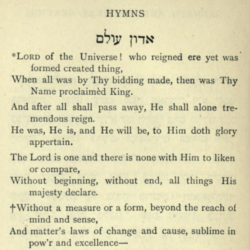
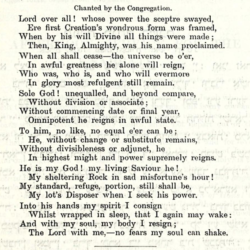

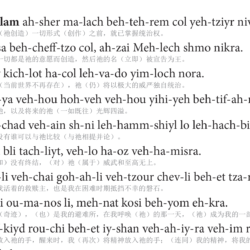


Leave a Reply